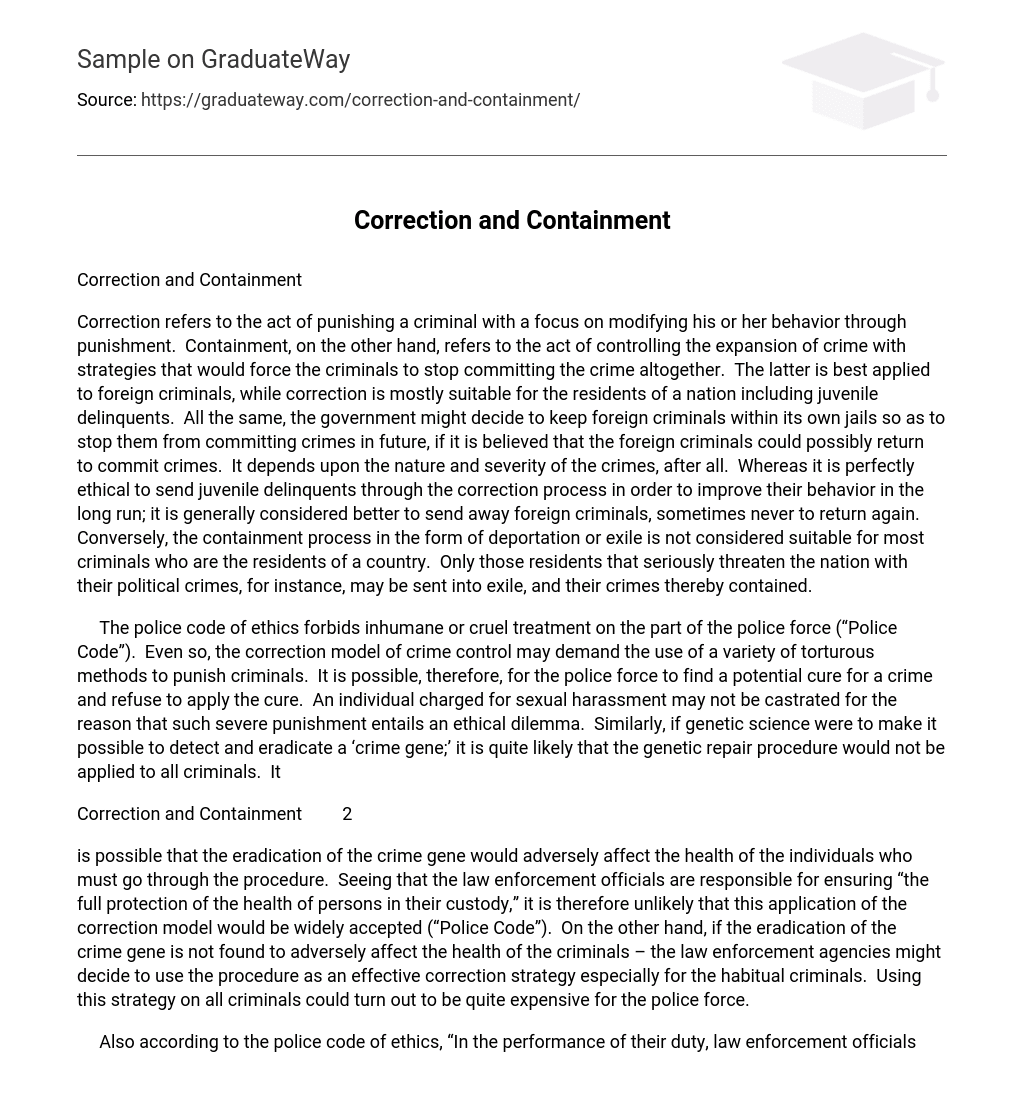Correction refers to the act of punishing a criminal with a focus on modifying his or her behavior through punishment. Containment, on the other hand, refers to the act of controlling the expansion of crime with strategies that would force the criminals to stop committing the crime altogether. The latter is best applied to foreign criminals, while correction is mostly suitable for the residents of a nation including juvenile delinquents. All the same, the government might decide to keep foreign criminals within its own jails so as to stop them from committing crimes in future, if it is believed that the foreign criminals could possibly return to commit crimes. It depends upon the nature and severity of the crimes, after all. Whereas it is perfectly ethical to send juvenile delinquents through the correction process in order to improve their behavior in the long run; it is generally considered better to send away foreign criminals, sometimes never to return again. Conversely, the containment process in the form of deportation or exile is not considered suitable for most criminals who are the residents of a country. Only those residents that seriously threaten the nation with their political crimes, for instance, may be sent into exile, and their crimes thereby contained.
The police code of ethics forbids inhumane or cruel treatment on the part of the police force (“Police Code”). Even so, the correction model of crime control may demand the use of a variety of torturous methods to punish criminals. It is possible, therefore, for the police force to find a potential cure for a crime and refuse to apply the cure. An individual charged for sexual harassment may not be castrated for the reason that such severe punishment entails an ethical dilemma. Similarly, if genetic science were to make it possible to detect and eradicate a ‘crime gene;’ it is quite likely that the genetic repair procedure would not be applied to all criminals. It
Correction and Containment 2
is possible that the eradication of the crime gene would adversely affect the health of the individuals who must go through the procedure. Seeing that the law enforcement officials are responsible for ensuring “the full protection of the health of persons in their custody,” it is therefore unlikely that this application of the correction model would be widely accepted (“Police Code”). On the other hand, if the eradication of the crime gene is not found to adversely affect the health of the criminals – the law enforcement agencies might decide to use the procedure as an effective correction strategy especially for the habitual criminals. Using this strategy on all criminals could turn out to be quite expensive for the police force.
Also according to the police code of ethics, “In the performance of their duty, law enforcement officials shall respect and protect human dignity and maintain and uphold the human rights of all persons” (“Police Code”). Seeing that there is no question of dignity accorded to human beings outside of their planetary home, sending criminals to the moon would also be an ineffective strategy of crime control from an ethical standpoint. This containment strategy could be effective only in cases of the severest of crimes, e.g. the international crimes of Osama Bin Laden. In most cases, however, a perfect prison on the moon would not be considered appropriate, given that all criminals that are sent off to the moon would be deprived of their basic human rights, which must include the right of all people to remain on their planetary home without being pushed out except by way of death. Hence, both correction and containment strategies must take policing ethics into consideration in order to be effective.
References
Police Code of Ethics. Freedom to Care. Retrieved 26 June 2007, from
http://www.freedomtocare.org/page125.htm.





